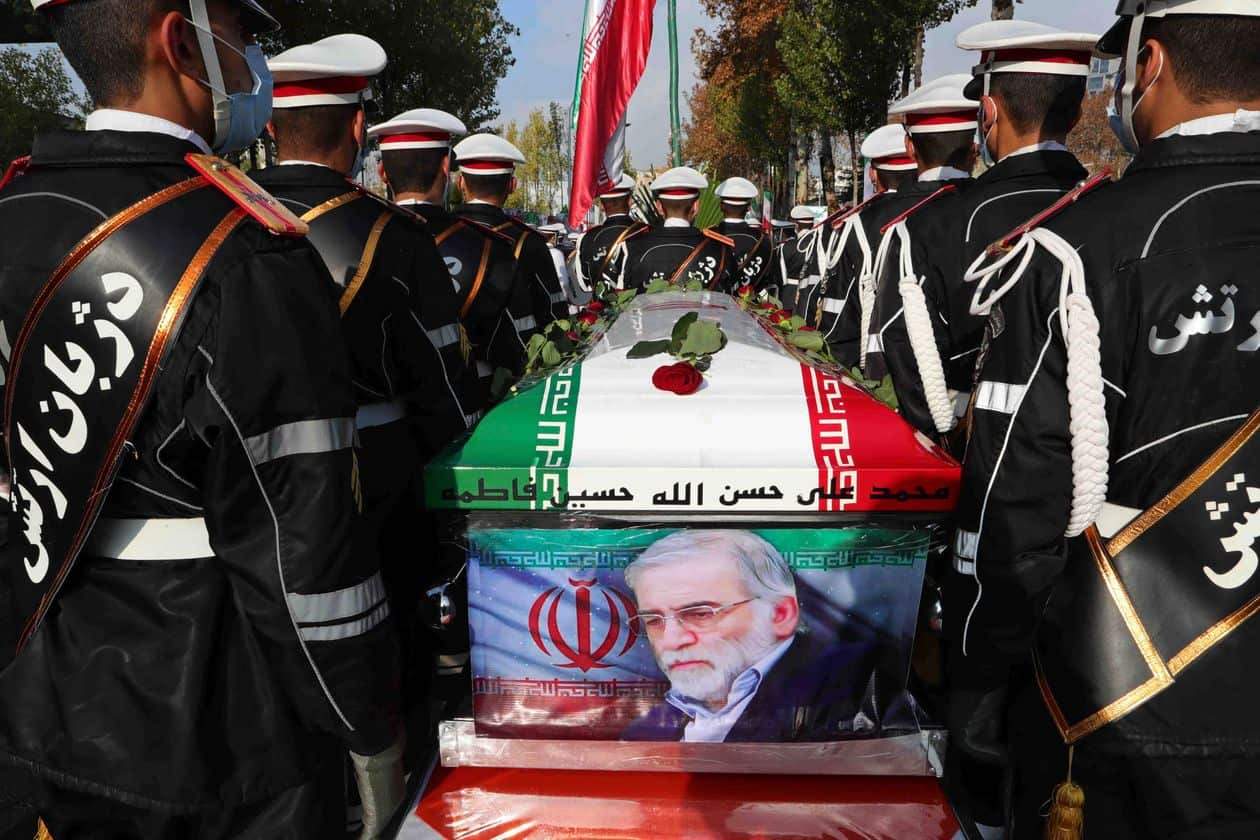Iran Nuclear Scientist Was Killed With ‘New Method,’ Tehran Says

The Iranian nuclear scientist killed last week was ambushed in a remotely controlled operation, the country’s top security official said Monday, describing an audacious attack that Tehran has blamed on Israel.
“The enemy used a completely new method, style and professional and specialized way to succeed in reaching its goal,” said Ali Shamkhani, secretary of Iran’s Supreme National Security Council, at the funeral procession for the scientist Monday.
Israel hasn’t confirmed or denied its involvement. “The assassination in Iran, whoever did it, it serves not only Israel, but the whole region and the world,” Yuval Steinitz, Israel’s energy minister and a member of Prime Minister Benjamin Netanyahu’s Likud party, told Kan public radio.
The scientist, Mohsen Fakhrizadeh, was traveling with his wife on Friday, the Iranian weekend, from the tranquil northern town of Rostamkola to Absard, a small town of cool weather and luxurious villas east of Tehran that is a popular vacation spot with the capital’s elite.
Entering Absard, the scientist’s four-car convoy took a U-turn on the highway around 2:30 p.m., and continued toward town. The convoy came under fire from a machine gun mounted on a Nissan pickup truck, which sprayed Mr. Fakhrizadeh’s car with bullets, leaving him wounded in the side and the back, with his spine severed, according to the semiofficial Fars news agency. The pickup truck then exploded, Fars reported.
Mr. Fakhrizadeh was transported first to a local medical clinic, then by helicopter to a military hospital in Tehran, where he died.
The death of the scientist, who is regarded as the father of Iran’s nuclear-weapons program in the 1990s and 2000s, adds to a spate of strikes in the past year against highly guarded Iranian security and nuclear personnel and facilities. Iran’s most prominent military commander, Maj. Gen. Qassem Soleimani, was killed by a U.S. drone strike in January after he disembarked a plane at Baghdad airport, drawing reprisal strikes from Tehran on an Iraqi base with U.S. military personnel. Nobody was killed at the base, but tensions with the U.S. soared over the attacks.
In July, an explosion ripped through Iran’s main nuclear facility, Natanz, destroying a centrifuge assembly hall.
Iran also accuses Israel of killing four nuclear scientists in Tehran between 2010 and 2012, accusations that Israel hasn’t confirmed or denied.
Iran hasn’t presented evidence that Israel was behind the killing of Mr. Fakhrizadeh. American and regional officials have said they suspect Israel was responsible.
Iranian security forces are holding up Mr. Fakhrizadeh and Gen. Soleimani as national heroes. Mr. Fakhrizadeh’s casket arrived Monday for a funeral procession in the holy city of Mashhad before returning to Tehran for burial. A similar procession was held in Mashhad in January for Gen. Soleimani.
Over the weekend, state television showed top officials and relatives of Mr. Fakhrizadeh mourning over the open casket, an unusual display in Iran, showing the scientist’s body wrapped in an Iranian flag.
Mr. Shamhkani said Israel had sought to kill Mr. Fakhrizadeh for the past 20 years. Iranian intelligence had reports of an assassination threat before Friday’s attack, but because they had received so many reports over the years, they failed to take it seriously, he said.
Some details about how Mr. Fakhrizadeh was killed remain murky, and access to foreign media is largely restricted in the Islamic Republic. Iranian state outlets and journalists have published contradictory information, including accounts that describe the attack beginning with an explosion that hit one of the cars, after which up to 12 gunmen leapt from motorcycles and a parked SUV and opened fire. It wasn’t clear how the killers escaped unharmed.
Mr. Shamkhani said that no perpetrators were present at the site and that the machine gun was controlled by electronic equipment.
The episode suggests that the perpetrators were able to gain detailed knowledge about the scientist’s movements.
Mr. Fakhrizadeh, who built up Iran’s nuclear program in the 1990s before it was disbanded in the early 2000s, was the highest-profile scientist targeted yet, often compared with Robert Oppenheimer, the American physicist who oversaw the U.S.’s efforts to build an atomic bomb in the 1940s. Mr. Fakhrizadeh, a well-connected operator, was presumed to be the official most capable of helping Iran shift from a civilian nuclear program to bomb-making, if it chose to.
His name first became widely known to the public in April 2018 after an Israeli raid months earlier where agents covertly extracted a trove of documents detailing Iran’s nuclear program in an operation in Tehran. Mr. Netanyahu said the documents proved that Mr. Fakhrizadeh was the chief architect behind a secret Iranian mission to develop nuclear weapons.
Iran says its enrichment program is for civilian purposes. U.S. intelligence agencies assessed after the American-led invasion of Iraq in 2003 that Iran had stopped working to design a nuclear weapon but cautioned that Tehran could be keeping its options open. The U.N.’s nuclear agency hasn’t found evidence that Iran currently has a nuclear weapons program.
Amos Yadlin, a former director of Israeli military intelligence, said that those who planned the operation aimed to make it difficult for the incoming Biden team to return to the 2015 nuclear deal. While the timing of the attack could partially be explained by operational considerations, those behind the attack have had other opportunities to target Mr. Fakhrizadeh, he said.
“They didn’t look only to Tehran, they looked to Washington as well,” Mr. Yadlin said.
Mr. Netanyahu said in a Twitter video for his political supporters posted on the day of the killing that he “can’t tell you everything” about what he had achieved on the job over the past week.
Photo: Military personnel stand near the flag-draped coffin of Mohsen Fakhrizadeh during a funeral ceremony in Tehran on Monday. - IRANIAN DEFENSE MINISTRY/ASSOCIATED PRESS
Link: https://www.wsj.com/articles/iran-nuclear-scientist-was-killed-with-new-method-tehran-says-11606764574




